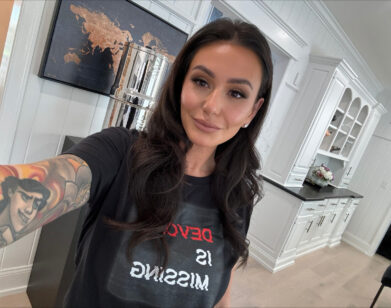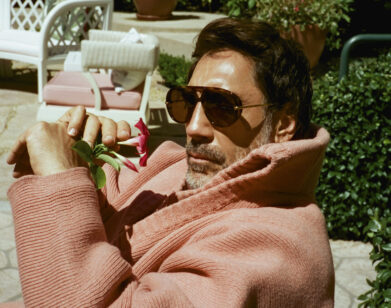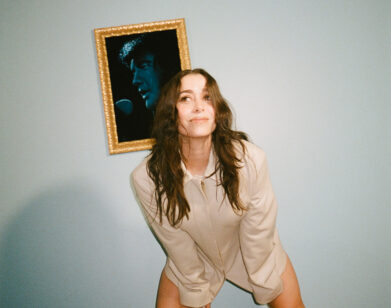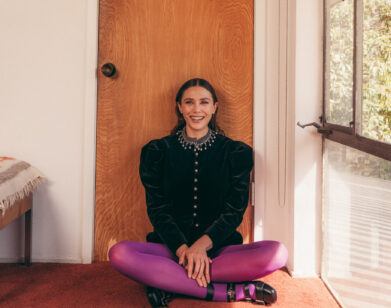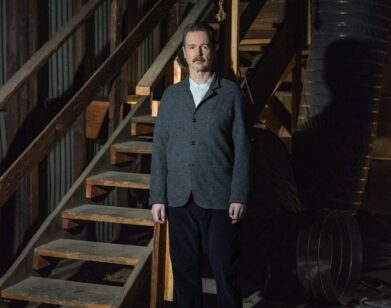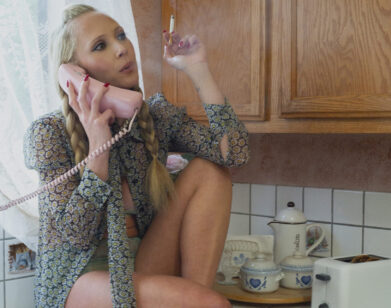The Celluloid Peaches
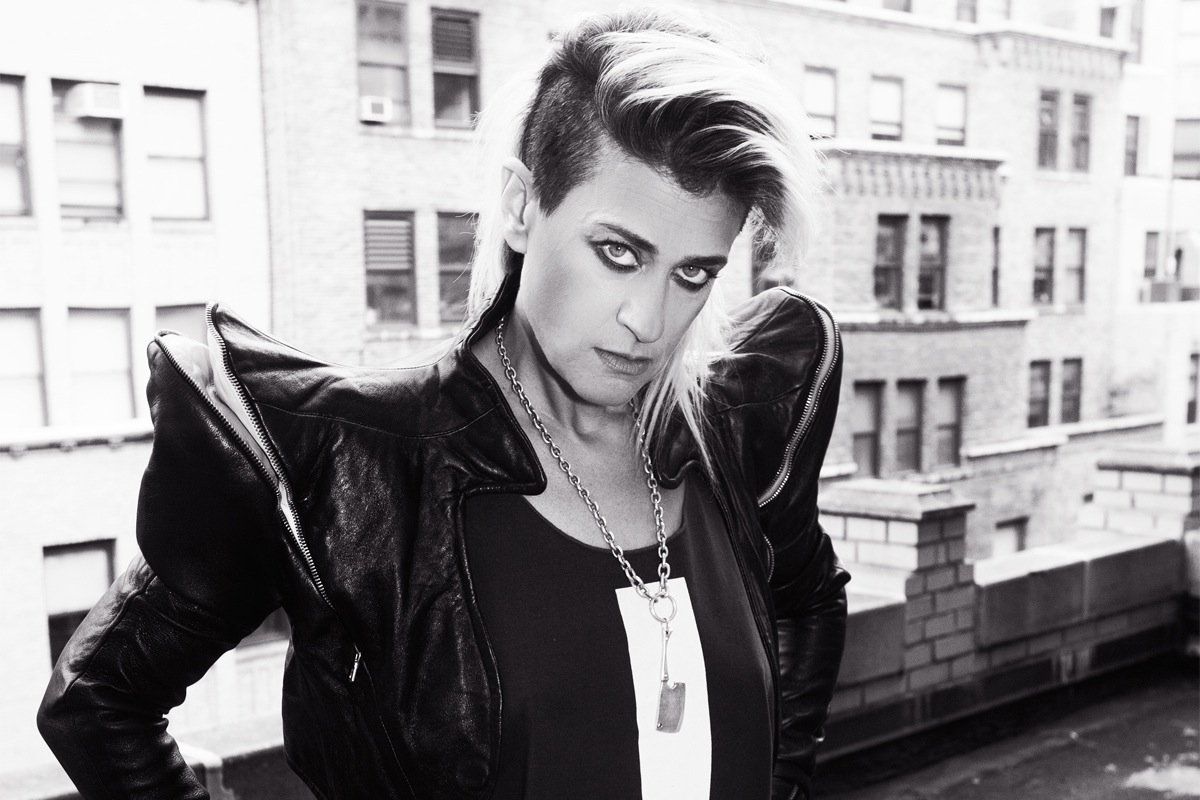
ABOVE: PEACHES. PHOTO BY SANTIAGO FELIPE
Singer and performance artist Peaches was born in Canada under the name Merrill Beth Nisker. She taught music and drama at Hebrew School until she started to release albums in 1995, adopting the name Peaches from the Joni Mitchell song, “Carey,” and moving to Berlin in 2000. Right now, she’s in New York City to screen her new film, Peaches Does Herself, and perform at (Le) Poisson Rouge. The film has been called an electro-rock opera and is all music, featuring 22 of Peaches’ songs, including such gems as “Teaches of Peaches” and “Fatherfucker,” played by Peaches’ band, the Sweet Machine. Known for being an outrageous and outspoken performer and songwriter who rebels against traditional mores and gender restrictions, Peaches looked tanned, rested, and ready to kick out the jams when we met her in a midtown office.
GERRY VISCO: Tell me about your new film, Peaches Does Herself.
PEACHES: This is not a jukebox musical. I don’t like the way they take the body of work from an artist and recreate a completely new story that has nothing to do with the artist and add dialogue to that, making it even more ridiculous. I prefer musicals that have no dialogue, that tell the story through the actual music. I like when the music relates to the artist, so I decided to make an anti-jukebox musical. I’d create a narrative that was based on the Peaches world and used my songs to move through the narrative, which is about a wannabe girl experimenting with music and goes into a fantastical world. I get too big and aggressive, based upon the misconceptions that people have of me. There’s a love story and a heartbreak, and a transformation that deals with my concerns of beauty and sexuality and gender and age.
VISCO: This is quite a colorful production. But after all, you do have a background in theater. You performed in your show Peaches Christ Superstar and you also played Orfeo in Monteverdi’s opera—you were the only singer without a classically trained voice.
PEACHES: I’ve always been a singer. Everyone else in Orfeo was this young hot opera singer and I was playing the lead role, Orfeo. It was in Italian. It was a big challenge, but it helped me stretch my voice.
VISCO: Any plans to come sing at the Met?
PEACHES: I’m ready! I went to theater school to become a theater director and then quickly realized I did not want to make a lot of productions with lots of people and have major anxiety and crazy stress and more anger directed at making a production rather than putting the anger into the actual creativity, so I quit that and finished a degree in fine arts, which was an exploration of all different mediums and started to make music and realized that music is awesome because it’s way more immediate. It has that immediate connection with people more than theater and it was a great way for me to express myself and have that immediacy. That’s why I switched over to music. This movie happened because the theater in Berlin, Hebbel am Ufer, asked me to put on a production, but it wasn’t my idea to put on a production.
VISCO: And when was this?
PEACHES: This was in 2010. They said, we want you to put on a production, and the first thing that came out of my mouth was I want to do Jesus Christ Superstar as a one woman show and I want to call it Peaches Christ Superstar and they were like, “Great! What else do you want to do, because that sounds like it’s going to be a no-brainer,” which was really hard because Andrew Lloyd Webber banned the production and didn’t want me to do it.
VISCO: Initially or later? Because I actually saw it in Brooklyn.
PEACHES: It was always a struggle. I still always have to get crazy permission and he wants to take a lot of the percentage all of the time but the thing was, it wasn’t a huge production. I love that music. I was trying to bring it back to what it was really about which was the music and the story, and not just religion and Jesus. It’s about this human trying to do the right thing, and getting knocked down which happens in all sorts of different situations. The melody is great and it’s passionate. For me to sing it was really challenging and I wasn’t singing it as a joke or a comedy, I was like, I’m really going to fucking hit those notes and do them right.
VISCO: Has Andrew Lloyd Weber ever seen the production?
PEACHES: No, but Tim Rice came and he liked it, and I got to do it in London for Yoko Ono’s Meltdown. I did a bunch of stuff including her “cut piece,” where you cut the clothes off. I knew that if it was through Yoko Ono, who’s going to say no to her? Doing it in London was a goal, since that’s where Jesus Christ Superstar originated. Then they later said do another piece, and I really didn’t know what to do. I was thinking about the history of burlesque in the ’20s, and then I was like, “Fuck that.” What I do is futuristic burlesque, and I’m not going to try to make it something it’s not. I have all my iconography, all my experience from the last 10 years, all the burlesque, all the music, all the controversy if you will. I just needed to build characters. I’d heard of [co-star] Sandy Kane from her cable access TV show.
VISCO: Is she the 65-year-old?
PEACHES: She’s in Times Square every day as the Naked Cowgirl. She wasn’t acting but played herself. And for her it was a great experience because she never thought about rapping. It was very inspiring for her. We shot it in Berlin. She never goes outside of the United States, and it was a big deal for her to be there. And Danni [Daniels] I met two weeks before; I had to solidify what I was doing. She came up to me and said she lost her virginity in the back of a van when she was 14 in Florida and now she can shake her dick and her tits. And I said, “You’re perfect, you’re the younger new ideal of beauty.” Once I had Sandy and Danni, I took a narrative that’s loosely based on what I’ve gone through and misconceptions of what people had of me and brought it all together.
VISCO: You mention the misconceptions people had of you. What are they?
PEACHES: People wonder if I’m completely porn, if I have a dick, if I’m a crazy feminist, all sorts of stuff.
VISCO: Would you say that’s an affectionate wondering or some of it is hostile?
PEACHES: I don’t mind, I just think it’s fascinating that people have so many opinions about one thing.
VISCO: But you transmogrify in your show, so maybe it makes provokes people to speculate.
PEACHES: Well, that’s good. It starts a discussion, and that’s okay.
VISCO: In the movie, which is being called an electro-rock opera, what were the challenges of directing both yourself and the other performers?
PEACHES: It’s a challenge, because you’re in it and trying to do scenes. I felt comfortable in the role, because I’d been doing it for the past year. I had to let people do their jobs, like the choreographer, the art director, and give people the initial ideas but also let people run with their buzz.
VISCO: Were the visuals in the film your conception?
PEACHES: Yes, they’re my ideas. Like, we have to have a big pussy bed. The first half of the movie is more pussy and the second half is dick. It’s basically a love story, a heartbreak story, a coming into yourself and realizing who you are. You try to become who you are.
VISCO: What were some of the inspirations for the film, the mythology?
PEACHES: I used a lot of my own iconography through videos I’ve made in the past. I’ve tried to fit in everything I’ve come to love. Or course, I grew up on Busby Berkeley movies and even the 1950s Singin’ In the Rain. Late at night when I was seven years old, I saw Phantom of the Paradise on TV and Tommy, and those two movies stuck in my brain. I loved them—especially the Acid Queen scene, which was incredible. The most quintessential scene for me is when I meet Danni and fall in love, on the park bench. I’m in this ridiculous clown version of a transsexual and using the half-man, half-woman dancers. A lot of musicians I know say they hate musicals, but there’s Tommy and Rocky Horror Picture Show or Jesus Christ Superstar, so I wanted to make one like that.
VISCO: Any new movie projects in the works?
PEACHES: Actually, I’m working with film director Marie Losier, who worked on the Genesis P-Orridge film. Marie always makes experimental films. It may be a full-length film.
VISCO: In terms of funding, did it cost a lot to make?
PEACHES: People are going to hate me, but this was a total dream. We did it at the theater. Like most things that happen to me, it happened as a kind of a mistake. I didn’t ask to do the theater production or to make it into a movie, we just filmed it really well. We looked at the footage and said, “Well, this could be a movie.” Then we kept going with some close ups. All the music in the film is live.
VISCO: Not to ask an obvious question, but what about gender in the film?
PEACHES: It’s funny because one reviewer said that I’m a man hater and I thought that was incredible. It was because there was no male central character in the film but you see that all the time.
VISCO: You have a yin and yang gender balance, which works for the film. When’s the film officially released?
PEACHES: It’s played in about 60 festivals so far and is going to have runs in theaters in Europe and the States, but probably sometime in December the film will be available for purchase.
PEACHES DOES HERSELF IS NOW PLAYING AT THE QUAD CINEMA IN NEW YORK CITY.

